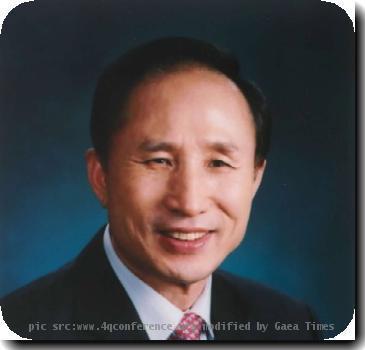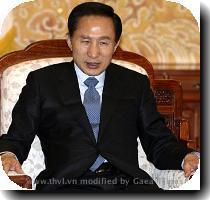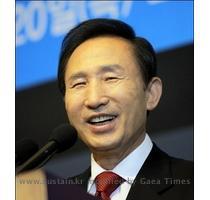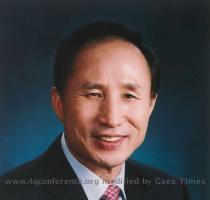SKorea hands over letter officially referring NKorea to UN Security Council over ship sinking
By Vijay Joshi, APFriday, June 4, 2010
SKorea seeks UN action against NKorea over ship
UNITED NATIONS — South Korea officially referred North Korea to the U.N. Security Council on Friday over the sinking of a navy ship that killed 46 sailors, taking its strongest step ever toward making the communist North face international punishment.
It set the stage for the possibility of the most intense confrontation between North Korea and the U.N. Security Council since the 1950-1953 Korean War, authorized by the council in response to an invasion of South Korea by Pyongyang’s forces.
South Korea’s U.N. Ambassador Park In-kook handed over a letter Friday to Mexico’s U.N. Ambassador Claude Heller, the current Security Council president, asking for a response from the U.N.’s most powerful body to deter “any further provocations.”
North Korea has steadfastly denied responsibility for the sinking of the Cheonan and naval spokesman Col. Pak In Ho warned last month in comments to broadcaster AP Television News that any move to retaliate or punish Pyongyang would mean war.
Heller circulated the letter to the 14 other council members and said he would initiate discussions “to give an appropriate answer to this request.” Closed-door council consultations were scheduled for Monday morning, according to the U.N. spokesman’s office.
Despite a history of being attacked by North Korea, Seoul has never taken Pyongyang to the Security Council for an inter-Korean provocation, indicating now that it wants to take the matter beyond the Korean peninsula.
In the letter, Park said an international investigation determined that the torpedo that sank the 1,200-ton South Korean corvette Cheonan in March was made in North Korea and that additional evidence pointed “overwhelmingly” to the conclusion that it was fired by a North Korean submarine.
He called the attack a violation of the U.N. Charter, the 1953 Armistice Agreement that ended the Korean War, and the 1992 North-South agreement on reconciliation, nonaggression and cooperation. The two Koreas technically remain in a state of war because their three-year conflict ended in a truce, not a peace treaty, in 1953.
“As such, the armed attack by North Korea constitutes a threat to the peace and security on the Korean peninsula and beyond,” he said.
“My government requests that the Security Council duly consider this matter and respond in a manner appropriate to the gravity of North Korea’s military provocation in order to deter recurrence of any further provocation by North Korea,” Park said.
The letter was delivered hours after South Korea’s president, in a hard-hitting speech bereft of diplomatic politeness, called North Korea a liar and a threat to northeast Asia. He called the ship attack “a military provocation” that also “undermines global peace.”
“North Korea must admit its wrongdoing” and “pledge to never again engage in such a reprehensible action,” President Lee Myung-bak said. “If the enemy continues to taunt us and think that they can do whatever they want they must understand that there is a limit.”
They “must understand very clearly that they will have to suffer the consequences.”
Lee, who was addressing Asia-Pacific defense ministers including U.S. Defense Secretary Robert Gates, called for international support to act against North Korea and its secret nuclear weapons program.
The Security Council has several choices, a resolution with or without new sanctions against North Korea, a weaker presidential statement calling for specific actions, or a press statement.
U.N. diplomats familiar with consultations on possible action against North Korea said China, the North’s closest ally, is opposed to new sanctions and indicated the more likely result will be a presidential statement. The diplomats spoke on condition of anonymity because the contacts have been private.
The Security Council previously imposed sanctions against Pyongyang after its two nuclear tests in 2006 and 2009. These include U.N. embargoes on nuclear and ballistic missile related items and technology, on arms exports and imports except light weapons, and on luxury goods.
Frosty relations between the Koreas have plunged since the sinking of the Cheonan in March, and tensions have increased in northeast Asia.
When ambassador Park was asked at U.N. headquarters what kind of action South Korea would like, he replied: “I think the action which is commensurate with the gravity of this situation.”
Speaking to reporters in Singapore after meeting South Korea’s defense minister, U.S. defense chief Gates pledged American support for South Korea, whether it pursues a strong denunciation of North Korea or a milder reprimand.
Stopping short of a resolution — which China could veto — should not be seen as any weakness, Gates said.
A less confrontational option “may be more addressed to the worry about provoking further instability and further provocations from the North,” he said.
Asked whether a toothless response from the U.N. would weaken the U.S. as it tries to deter the nuclear ambitions of both North Korea and Iran, Gates had a clipped reply.
“I don’t think anybody believes the United States is a paper tiger.”
Recent problems between South and North have involved Pyongyang’s secretive nuclear weapons program.
Lee, the South Korean president, said the world is undergoing rapid changes and each country is trying to stay ahead.
“However there is one country in the world that still refuses to change. There is one country that is still living in the past. And that country is North Korea,” he said. “North Korea, despite its appalling economy is still engaged in its attempt to become a nuclear weapon state.”
In his speech, Lee laid out a litany of complaints against North Korea, including a 1983 assassination attempt on the South Korean president that killed 21 other people and the time-bomb attack of a Korean Air flight in 1987 that killed all 115 people on board.
Both times, North Korea denied a hand and claimed the accusations were fabricated. Even in the latest confrontation, it has accused the U.S. military of mistakenly firing a torpedo at the Cheonan.
In North Korea, the military rank and file continued to repeat the official line with excessively nationalistic phrases.
“If an enemy dares to invade our land, territory, or sea even an inch, the (North Korean army) will mercilessly punish the enemy with the might of our army-first leadership,” Cpl. Kim Kwang Chol told Associated Press Television News on the North Korean side of the demilitarized zone before Lee delivered his speech.
Joshi reported from Singapore. Associated Press Writers John Heilprin at the United Nations and Anne Gearan and Alex Kennedy in Singapore contributed to this report.
Tags: Asia, East Asia, Foreign Policy, International Incidents, International Trade, Lee Myung-bak, North America, North Korea, Nuclear Weapons, Pyongyang, Singapore, South Korea, Southeast Asia, United Nations, United States, Weapons Administration, Weapons Of Mass Destruction



